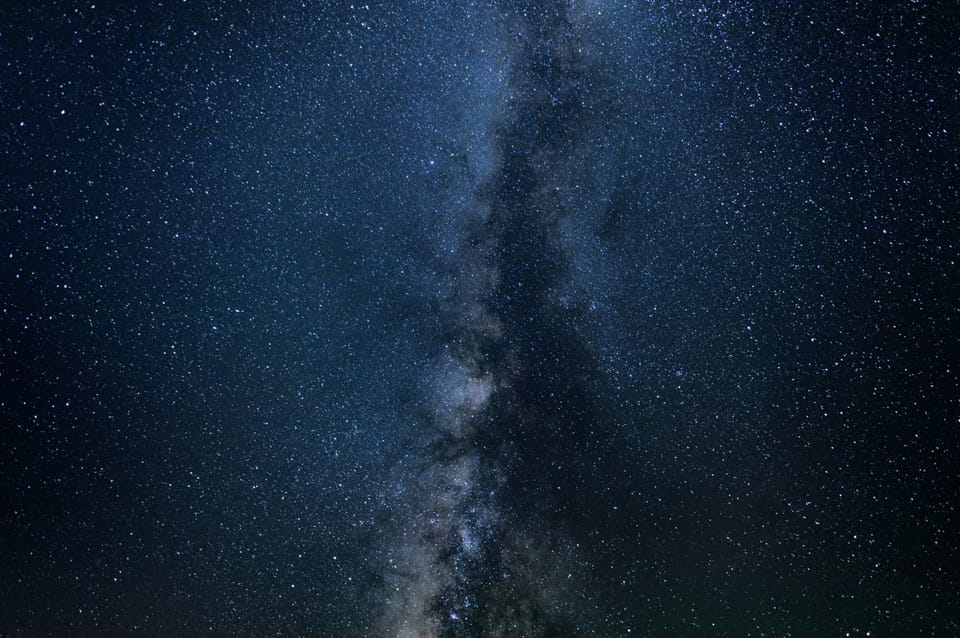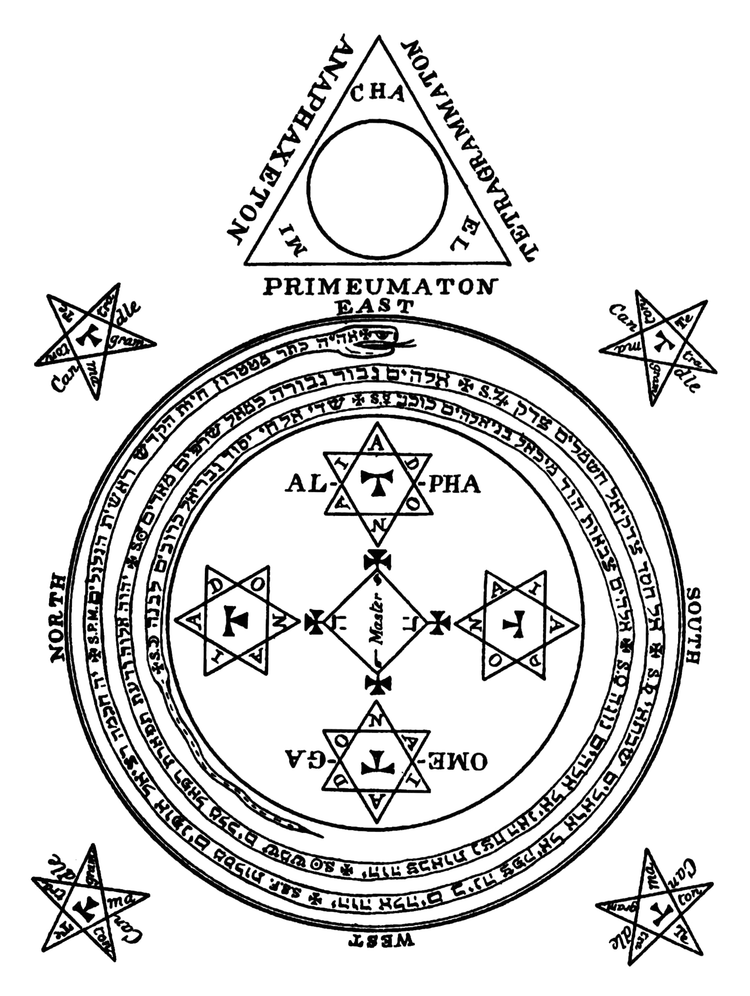New Moon: On a moonless night

It's Friday, and our rose bush is on the brink of erupting with ten times more flowers than we ever have seen on it before, perhaps because we removed another landscaping bush that was blocking its morning sunlight. The Siberian irises are also blooming, and further from this house the poppy is preparing to open its hairy buds for those few precious days of red paper petals. Across the remnants of our lawn and backyard — now more a partial meadow and woodland edge — milkweed is rising to cup the sky, and the ground cover is riddled by yellow cinquefoil and white wild strawberry blossoms that we've never seen bloom here before. It's good to not be in drought anymore, and wonderful to see what grows here when we allow a little rewilding.
Hello.
While I deal most with night sky work when the Moon is full because the veil is thinnest, this practice relies on the thin veil's benefits for divination and storytelling. For any stargazers like me, however, the opposite pole of the lunar cycle is also important on a mundane level because without the Moon's reflected light it becomes much easier to see the stars. Full Moons are the bane of scientific astronomy, while New Moons are a boon. This distinction plays a greater role when living in an age of shocking light pollution, which is so exceptionally bad in my area bordering the Northeast Megalopolis that although I should probably be seeing a night sky that qualifies as a 3 or 4 on the Bortle scale, it's at best a 6. So leading up to the New Moon and a few days following, I take special care to look at the stars or planets, and lately I've taken to a bedtime prayer of sorts: when falling asleep with the Moon mostly up, I ask her to send me guidance in my dreams, but when falling asleep after the Moon has already set (or when she will not rise till very late) I thank her for her daytime guidance and ask instead for the stars to kiss my sleeping eyes.
When on a moonless night in the right location we are blessed to see a veritable carpet of stars above, perhaps even another galaxy like the Andromeda or the center of our own in the Milky Way, we are viewing an immeasurably massive universe, and it is a naked reminder of our simultaneous uniqueness and insignificance here on this rolling mineral sphere dwarfed by a single star out of a septillion. The balance of those two facts is a paradox that's surely one of the oldest and most sacred mysteries in human experience. So here is a meditation on that mystery — and on others of the infinite cosmos.
To be everything & nothing
That which exists on the Earth is everything, because for the time being and perhaps forever[1] nearly every human will spend the entirety of their lifespan with their body on this ground, under this atmosphere. Ontologically the universe is not geocentric, but epistemologically it still is. Our planet is our ultimate reference point. Measurement of time is calibrated according to the Earth's axial rotation and orbit around the Sun. Even astronomers catalogue celestial objects by where they appear within the bounds of constellations that we see from here. And while raw physics tells us that the universe has no actual center, we can only gauge the age of anything in the cosmos according to how long it takes light from that source to reach us.
But that which exists on Earth is also nothing. All that we or even prior earthly life forms have witnessed is a mere sliver of a fraction of the events that have transpired since the universe's inception. All we can see of the wider cosmos right now is a delayed snapshot of the past; and no matter how effectively we survive the current apocalypse, it is probably biochemically and then physically impossible for us to survive certain conditions that will eventually develop in our solar system and later the universe as a whole, therefore we will inevitably miss some portion of that which is to come. On a cosmic scale we are the spatial and temporal equivalent of a dust mote.
Some people would prefer to be everything than to be nothing. However, it is often the very nothingness that comforts me when I gaze up at a starry sky, because with insignificance comes the reassurance that anything we do, anything I do, will not affect the entities that are so much more constant and timeless than ourselves. While even the stars are not permanent and their positions do change, humans cannot affect this in the way we affect our global ecosystem. And though ethical breaches — incidents of people behaving in bad faith, bad relation — merit atonement and reconciliation, the stars themselves do not judge us. They are beautifully unbothered.
By contrast, I find it intimidating to feel singular, unique, and total. This imbues every choice we make with utmost importance. Sartre described us as "condemned to be free," but I think a closer phrasing of his existentialist philosophy, which I still often abide by, is that we are condemned to be responsible. That weight can overwhelm and sometimes terrify us. This is why trusting in some concept of fate can feel so soothing; we perceive all things coming to pass as they "ought" or as we certainly cannot alter, so we don't need to question what role we play in all of it.
But then again, sometimes when many dreadful things are happening at once this makes it not so worthwhile to trust in fate. People may retreat from making hard choices for fear of making everything worse, but this also impedes the likelihood of making anything better. When it comes to something like the eco crisis, I believe we do need to acknowledge our profound agency, our ability to leave a mark on things around us. Our centrality. For if we do not take responsibility, then we risk destroying ourselves as the universe's fleeting and unique witnesses.
First contact vs. great filter
Dwelling in such infinite vastness, staring up (out? forward?) at it, I ask as so many have done: does our everythingness extend to occupying the only planet where life has arisen? Or are we merely part of a wider pattern of life forms beginning, evolving, and with some luck eventually meeting one another? Would that too make us nothing, or would that make us a different sort of everything, belonging to an even broader us?
I have always been interested in the search for extraterrestrial life, particularly if that life were capable of communication that we could ever understand, or if such communication were difficult to interpret but an obviously humanoid or animal-like flavor of sentience were still apparent. As an animist I see spirit in all things regardless, but I feel equal terror and fascination at the prospect of language that's transparently "advanced" by even narrow Western standards but also unreproducible by human anatomy — and likewise at the prospect of minds that can achieve the same kinds of things that we tool users can but without necessarily experiencing consciousness with the same senses as ours.[2]
Such an encounter would be the ultimate challenge in embassy and relation-building. And because colonial, imperial models of civilization have failed so utterly at such challenges with terrestrial, ecologically interwoven species, I would not have high hopes for how that idolized moment of first contact might go. But conversely, if it went well[3], in the process we might learn many things about how to relate better to all beings on our own planet.
Lately, in any case, I have hoped we might find clear extraterrestrial life in order to assuage a horrifyingly bleak thought that in my opinion is even worse than the chance of Earth's life existing all alone. As some readers may be familiar with, in 1950 the Italian-American physicist Enrico Fermi posed the question: "Where is everybody?" by which he meant what is now referred to as the Fermi paradox. The paradox is paraphrased as follows:
Even just in the Milky Way galaxy, there are billions of stars like the Sun. Some statistically significant percentage of those stars must have planets orbiting in a habitable zone to their stars, like where the Earth is relatively situated. Some significant percentage of those planets must be Earth-like in general. And because some of those stars and their planets have existed at least as long as the Sun and the Earth have, there has been ample time for those planets to develop life, including life that has evolved to the same degree as humans. And because humans have begun the very first stages of interstellar travel and communication, it would be very reasonable to assume that at least a few extraterrestrial civilizations of equal or greater age than our own have even achieved interstellar travel and communication. And even if such travel and communication were still relatively slow — such that, say, it took a few million years for anything from another planet in the same galaxy to reach us — there should be enough total planets with these advanced civilizations that even if the odds are not guaranteed of those entities overlapping in existence with humankind, the odds are decent, and so either someone else should have been able to visit us by now or with our current technology we should at least be able to have some idea of where such beings have evolved in this galaxy. So why have we never been clearly visited by such beings, and why do none of our own scans for intelligent extraterrestrial radio signals give us any sign that someone else out there is listening?
Decades later, other scientists like Frank Drake and Carl Sagan made a mathematical estimate of how many extraterrestrial civilizations might exist in the Milky Way, which was anywhere from 1,000 to 100,000,000. This is a very small fraction when you compare it with billions of star systems. Some argue that it is still too generous of a fraction. But even saying that only a few hundred such civilizations might exist instead, it still defies common sense to presume that not a single one of them could be perceived or encountered by humans with our current observational equipment.
One answer to this paradox is that everyone arguing in favor of the existence of extraterrestrial civilizations (or any extraterrestrial life) has overly high, unsupported confidence in how many habitable, Earth-like planets actually exist, or in what it takes for life to arise in the first place; in 1996 Robin Hanson suggested the idea of a "Great Filter" of biological miracles that needed to happen in order to produce humans in our current state, and of disasters like meteor strikes that need to be avoided. Another answer is that while the odds are better than nothing, because humans have only been around for an even shorter time than a few million years and because we have only been capable of monitoring deep space for just over a single century, of course we are not going to have found anything yet; perhaps the Fermi paradox expresses a rather embarrassing impatience when instead we need to position our search for extraterrestrial life on a much, much longer time scale.
I like thinking about things that way, but another alternative is the aforementioned bleakest thought: what if it is an overwhelming tendency for life, or at least the type of life that resembles humans, to snuff out, with only beings of less tool using ability managing to exist permanently and sustainably, and thus real extraterrestrial life will basically go unnoticed forever? What if the Great Filter is life destroying itself? Sagan formulated this concern in his work as a public intellectual, urging humanity to disarm and divest from all nuclear weapons given the existential threat they posed. Nowadays, the nuclear risk has not reduced by as much as we like to think, but more importantly we are undergoing an apocalypse already. And if we are destroyed by our own effects on our global ecosystem, then is it possible that on any planet where human-like life evolves, the same pattern is likely to happen before anyone can reliably establish a new home off-world?
The answer to this particular mystery must depend on whether capitalism, colonialism, imperialism, and any other extractive, entropic societal model will intrinsically take hold among at least some portions of tool-using life, or whether such societal models are akin to diseases that some species can fight off before too much damage occurs. One reason I love Ursula K. Le Guin's science fiction is that her extraterrestrial life forms show a plethora of societies, some of which have managed to avoid ever having an extractive ethos win out — either because it never began in the first place, or because the society recognized the problem and took action against it.
When it comes to Earth's own history, I do not think that the current course of things had to evolve; I blame a series of catastrophes. Empires do have a clear tendency to rise, but also to fall, and most of human history was spent with a decent portion of the populace managing to stay indigenous and continue their lifestyles regardless of occasional intrusions by the empire of the week. Disastrously, however, the Roman Empire's specific collapse was accompanied by an entropic, imperial religious ideology that managed to keep a foothold in every place the empire reached, and then virally replicated itself in further locations; add a continentally devastating plague several centuries later and the setting was just right for the Protestant capitalist worldview to take root and then metastasize. But even bearing all of that in mind, I suppose I fear that once those stages are achieved, a planet is then doomed to be eaten up before The Revolution can save it.
A challenge to the favored entropic model
I have described my most pessimistic thought about the universe. It goes hand in hand with the most commonly held astrophysical view that with how factors like dark energy are behaving amid the universe's constant expansion, it seems most likely that the universe's destiny is to expand forever — until all energy is used up and the expansion continues but only of a cold, dark, infinite void. This would obey Newton's Second Law of Thermodynamics, which among other things establishes that in an isolated system, entropy cannot decrease and can only increase until some maximum point where thermodynamic equilibrium is finally reached. If we live within an isolated system, then entropy , and this would surely be why time seems to move in a straight line and does not run backward. The cost of this forward motion is the heat death of the universe.
Despite such obvious logic, many thinkers I've paid attention to for the past few years, who are all in a shared discursive circle around animist land connection practices as decolonial tools[4], have jointly offered a critical counterargument to any assumption of de facto increasing entropy: the First Law of Thermodynamics is no less important than the Second. This law establishes the conservation of energy, where the amount of energy within a system can only be transformed, not destroyed. And according to this argument, we exist in a world filled with systems that, whether open or closed, are not isolated. These systems have a means of ultimately removing their entropy and regenerating themselves. "Westerners" must therefore go back to recognizing such systems, as indigenous communities already do, and do everything possible to oppose atomized existences, embrace cyclical rather than linear time, and develop intentional regenerative practices — building something strong enough to endure while the entropic models burn themselves out (again).
I could not agree more, so like these other thinkers I have taken to describing structures like capitalism not simply as evil but rather as entropic. But one matter that has continued to trouble me regardless is what seems like the universe's own demonstrable entropic course. What would it mean to have the universe be full of regenerative systems — not just on the Earth, but even in the life cycles of stars as many of them turn into nebulas after dying and in those nebulas new stars are born — and yet to have the universe itself ultimately be on a one-way course toward what some call the big freeze?
Well, an interesting scientific development has taken place. Within the past few years, a new hypothesis had been floated that the universe is much older than we thought and thus maybe also closer to "ending"[5]. But more significantly as of two months ago it appears that so-called dark energy, which astrophysicists have taken into account when predicting the outcome of the universe's expansion, is not behaving in the ways that the most common models assumed; in fact, dark energy is behaving in ways that renew the viability of a world-ending scenario dubbed the big crunch, wherein the universe cannot expand any further and collapses under its own mass. The big crunch hypothesis is not new, but it has been out of favor a while as the evidence pointed more toward heat death. Now that evidence is less certain, and I think it's worth considering (as the big crunch's proponents already do) that the universe may be forever expanding and contracting in an eternal cycle, reinventing itself each time, not entropic at all.
Lately, that is what I choose to imagine when I look up at the infinite starry sky. It feels more comforting than ever.
[1] No matter how much I personally do support interplanetary and interstellar missions — provided that it's for knowledge, embassy, and collaboration, rather than for colonial extraction — I cannot say our species is currently on a good course to ever travel anywhere beyond the Moon. More on that issue in the rest of this post.
[2] Essentially a heightened version of the Philosophy of Mind 101 question, "What if the way I see red is the way you see blue?" or the more unfortunate example of white supremacist ideology failing to conceive of non-white persons as, well, persons.
[3] I do have some fears about whether any extraterrestrial species we met would be de facto interstellar colonizers themselves, but I think that leaping to this conclusion would only enable taking a needlessly defensive, militaristic approach to our own space exploration. The only way to achieve a win-win outcome from the prisoner's dilemma is, as ever, to have both parties assume the best behavior from each other and respond accordingly.
[4] My usual references of Yunkaporta and Rasmussen, but also plenty of others.
[5] Not on any time scale that affects human beings.
Thank you for reading. I know I already wrote a fairly recent reminder, but I have to ask for paid subscriptions more than usual, if you can spare even $1/month. I am searching for day jobs in one of the most abysmal labor markets imaginable; my unemployment benefits only barely help my household break even; and those benefits will be expiring in the middle of August. I write things here that I would also write if I did not need money, but if these writings bring enrichment to your weekends then I would sincerely appreciate a reciprocal exchange.
Next week, for subscribers who do pay there will be a post returning to some tree lore; after that, I'll have a public post again, this time concerning both the Otherworld and the Underworld.





Member discussion